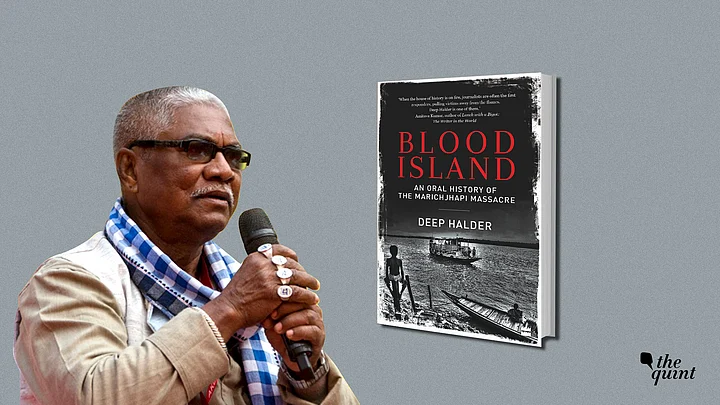(The following is Deep Halder’s interview with author-activist Manoranjan Byapari in the former’s book ‘Blood Island: An Oral History of the Marichjhapi Massacre’, and has been excerpted with permission from the author and the publisher, Harper Collins India.)
(Sub-headers have been added by The Quint, and are NOT part of the book.)
Manoranjan Byapari is mildly amused by the Bengali ‘bhadraloks’ who watch world cinema, attend literary festivals, mourn the spread of communalism in the country’s polity and now swear by his books. These are the same people, Byapari tells me, who looked the other way when ‘chotoloks’ (the ‘class-less’ and the ‘caste-less’) were being butchered outside Calcutta in the island of Marichjhapi.
These are the very people who kept quiet when the refugees who came back from Dandakaranya in search of home, died by the wayside in Calcutta and its outskirts, from hunger and illness.
‘My Pen Doesn’t Bow Before Brahmins’
Byapari has seen a bit of life’s seamy side. He was a rickshaw-puller who became a writer, a homeless refugee who was sodomised by a policeman, and a Naxal who survived the bullet. As a self-confessed ‘chotolok’, he has also cleaned the ‘bhadralok’s’ toilet and then written books that made him famous among the intelligentsia. Byapari’s autobiographical outpourings in the book Interrogating My Chandal Life: An Autobiography of a Dalit was the toast of the Jaipur Literature Festival in 2018.
Byapari’s writings would have remained hidden below the backseat of the cycle rickshaw he pulled, had it not been for a chance encounter with activist-writer Mahasweta Devi.
She helped his books get published, opening the gates for protest literature in the genteel world of Kolkata’s ‘culture keepers’. In one of his poems, he writes:
My pen is not that which bows before the Brahmins
Or prays for respite from those whose hands are still bloody from Marichjhapi deaths
My pen is mine
Sharp like that arrow which knows no stopping till it finds its target.
Why Voices Like Manoranjan Byapari’s Will Always Stay Relevant
It is voices like Byapari’s that help stories of massacres like Marichjhapi stay alive in public memory. Voices that can be appropriated neither by the State nor talk-circuit sophistry. During my visit to Alabama in June later in the year, Howard Robinson, a history professor at Alabama State University, would tell me how oral history has kept the African-American struggle alive down the ages, when mainstream press and even literary fiction would whitewash crimes against the community.
“Where were these people when the police broke the bones of my father’s chest in Marichjhapi with a rifle’s butt? My father was no leader of men; he was an honest man in search of an honest life, who could never recover from his injuries in Marichjhapi and died from chest problems.”
Byapari’s eyes glow in the dark. The evening crowd that has gathered at the tea stall next to the Shiv Mandir near Santoshpur lake in south Kolkata, seems to have heard such statements before.
This open space is Byapari’s den, and the motley crew of students, researchers, government clerks and nameless faces that surround him, is his regular audience. Fame has robbed Byapari neither of his agitprop credentials, nor his earthiness. When I called him for an interview on Marichjhapi, he readily agreed and gave me directions to his haunt.
“Caste-Hatred Led to Marichjhapi Massacre”
Inhaling the exhaust fumes from minibuses and autorickshaws, and sipping on steaming lemon tea, Byapari lets loose his poison tongue.
“Caste-hatred led to Marichjhapi massacre.”
“But,” I feebly butt in, “the communists always advocated for a classless, casteless society.”
“That is all gibberish. You know nothing! Even in the temporary refugee camps set up across Bengal for refugees crossing over from East Pakistan, there was caste discrimination. The upper-castes didn’t want to stay at the same camps as the Namasudras. They demanded separate camps.”
“Later, there were colonies where refugees forcibly occupied land. The first such place is Bijoygarh in south Calcutta. Since it was with the military before, electricity and water lines were already there. That apart, there were banks, a post office, a university … No less than twenty refugee colonies were allowed to be developed in the Jadavpur area where you stay. Find me a shudra family there and then talk! All are upper-castes.”
“Jyoti Basu Couldn’t Stand The Fact That ‘Chotoloks’ Could Dare to Dream”
“The government of the day, with Bidhan Chandra Roy as chief minister, didn’t evict them. In fact, they tried to facilitate such settlements. Roy had clearly said he wouldn’t allow bastis, constituting lower-class, lower-caste refugees, to spring up in his Bengal. Upper-castes were fine!”
“And what did the Communist government do? They didn’t question these illegal settlers either. So why did they adopt a separate set of rules for Marichjhapi settlers? Why were they beaten up, raped and killed for settling in a tract of land so far away from Calcutta, with no real estate value? If the settlers had been Brahmins, Kayasthas and Baidyas, there would have been no action.”
“Jyoti Basu couldn’t tolerate the fact that ‘chotoloks’ could dare to dream without bending before him. Marichjhapi settlers had declared that they had no need of any government assistance. They were self-sufficient and had built their own township.”
“But this is not what the Communist government wanted. Their deal was: ‘We will give you rice, you join our rallies, vote for us.’ If these people became independent, capable, which they were turning out to be, they wouldn’t depend on the government for food and clothes.”
(Deep Halder is Executive Editor, India Today Group Digital. He tweets @deepscribble.)
(At The Quint, we question everything. Play an active role in shaping our journalism by becoming a member today.)
